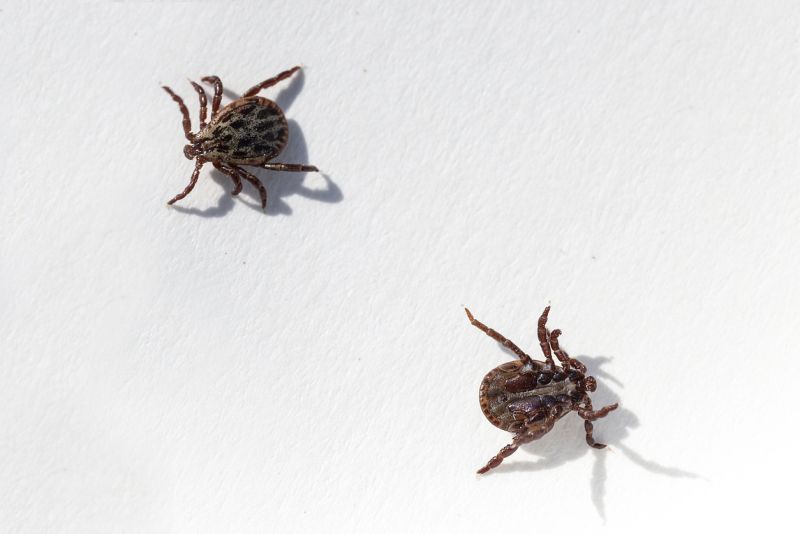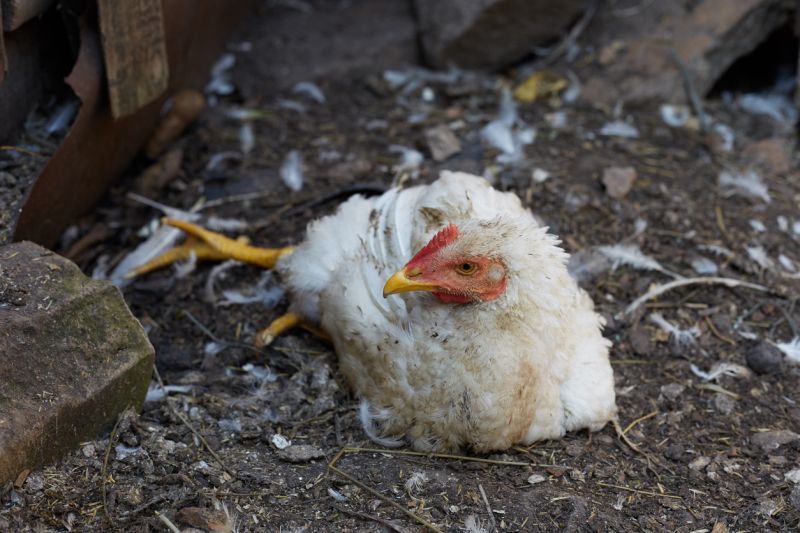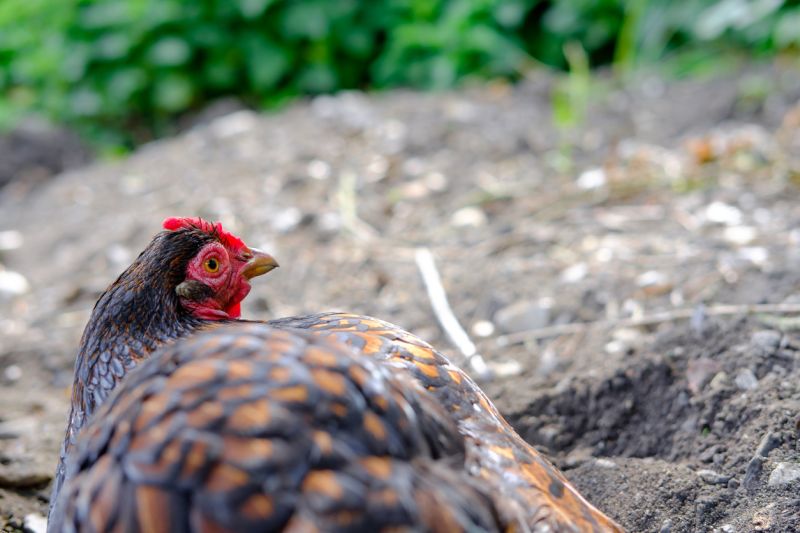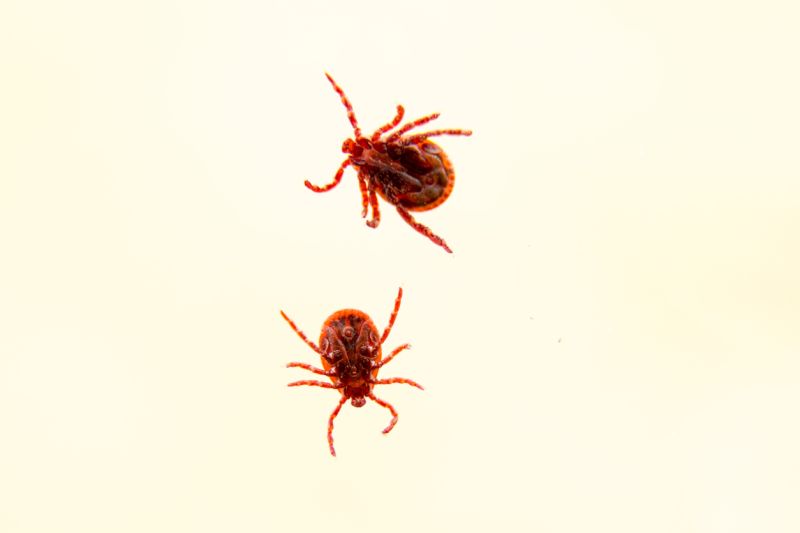Chicken mite treatment is essential if an infestation breaks out in your flock. Tiny pests can be a nuisance to get rid of, so here are some tips for handling poultry mites in your coop.
What are Chicken Mites?

Chicken mites, also known as poultry mites, are a type of external parasite that can infest chickens. They can thrive in all temperatures, but they most commonly appear in the summer.
Mites often look like tiny ticks because they’re both arachnids. Thus, mites have eight tiny legs on their round bodies instead of six. Most mites have a short lifespan of only a week, and they spend that time feasting on the blood of their host. If mites are biting your chickens, your birds will probably feel very itchy.
Common Types of Chicken Mites
There are several types of mites that can infest poultry, and they all cause similar issues. Here are some common types of chicken mites:
- Northern Fowl Mites – This is the most common type of mites for birds. They’ll usually lay clusters of tiny white eggs around the shaft of your chicken’s feathers.
- Red Roost Mites – Red Roost Mites behave similarly to Northern Fowl Mites, but they don’t normally live their whole lives on birds. In most cases, these mites will only come to feed on your chickens at night.
- Scaly Leg Mites – As the name implies, these mites feed on chicken legs, causing the skin to look scaly or crusty. It’s difficult for the naked eye to see these mites because they burrow under the skin of your chicken’s legs and feet. Inside the skin, they will leave feces behind, which can cause infections.
Can Chicken Mites Infest Humans?
Luckily, mites won’t infest humans like they do for chickens. Mites will bite humans if given the chance, but they’re unable to live off only human blood. You might experience itchiness from the bites, but it won’t last long. It’s unlikely that they will harm dogs or cats either.
In some instances, your chickens might have lice instead of mites. If this is the case, the lice can affect you. The main difference between lice and mites is that lice feed on dead skin while mites need to draw blood. Mites are more likely to cause other health concerns as a result of the blood loss.
Signs of a Chicken Mite Infestation

It’s difficult to spot a mite infestation since they’re so tiny. Mites are most active at night, so an early sign is your chicken refusing to go to the place they normally sleep. They might be reluctant to go into the coop or nesting box because they keep getting bit.
If you suspect that there may be a mite infestation, inspect your chickens. Examine the base of their feathers for egg clusters. Look for irritated skin, feather loss, or blood spots. If one bird has signs of mites, there’s a good chance the other chickens do too.
You can also inspect your chicken coop for signs of mites. It’s best to search at night using a flashlight. You might be able to spot tiny mites running around by looking around the nesting boxes and perches. If you don’t see any mites, rub a piece of white paper on surfaces of the coop. Red spots will likely appear on the paper if there are mites present.
Mites are difficult to catch early on, so don’t take signs lightly. If you suspect that your chickens are infested, it can’t hurt to check. If you find any signs of mites, it’s time to select an effective chicken mite treatment.
Chicken Mite Treatment Options
There are lots of chicken mite treatment options for keepers to try. Depending on the severity of the infestation, you may need to attempt more than one of these methods.
Dust Baths

Chicken enclosures should have dust baths accessible to the birds, but if you don’t have any, it’s a good idea to get some. All you have to do is set the dust baths in the enclosure, and the chickens will start using them on their own.
Dust baths can help prevent and remove parasites from your chicken’s feathers. If you already know of a chicken infestation, add Diatomaceous earth to the dust bath, which will more effectively deter the mites on your birds. Dust baths probably won’t stop an infestation completely, but they can help.
Diatomaceous Earth
Diatomaceous earth is a naturally occurring sedimentary rock. It can be ground up into a powder that deters mites. It can be added to a dust bath, but it should also be spread around the coop or directly on their feathers.
Food-grade brands of Diatomaceous earth are the safest to use around chickens. When spreading it, try to keep it away from your birds’ eyes. Also, try to avoid breathing it in if possible. Wood ash is an alternative you can use that works about as well.
A Diet Change
Adding garlic, mint, or rosemary to your chicken feed may be enough to deter mites in early stages. These strong-smelling herbs make chicken blood less appealing to parasites. However, if the mite infestation is already out of control, it’s unlikely that this minor change will fix the issue on its own.
Natural Mite Spray
There are lots of mite sprays with natural ingredients to keep your chickens safe. If you can’t find any, you can make your own spray using water, dish soap, and oil. A good recipe is 2 cups of water, 1 cup of cooking oil, and 1 cup of dish washing liquid. Spread the spray around your chicken enclosure to remove the mites.
Another natural spray method to try is neem oil. The oil naturally comes from the neem tree, and it disrupts all kinds of pests, including mites and lice. The best way to disperse it is to mix it with apple cider vinegar and water, and then spray it around your chicken coop. You can also spray it on your chickens as a mite repellent.
Chemical Options
You should try natural methods before putting chemicals near your chickens. Yet, some infestations might be too intense to handle with natural treatments. It’ll be safest if you move your chickens to a different area while you spray chemicals. One of the safest mite sprays with chemicals is Permethrin.
It’s rare that you’ll need to resort to chemicals. The only reason to do it is if none of the natural treatments work or if the pests survive cold winter months.
Clean the Coop
Cleaning the coop is important even if you don’t have mites. Mites will often live in your chickens’ bedding, so if not cleaned and replaced regularly, parasites will appear. Before you spray or spread other chicken mite treatment methods throughout the coop, clean it thoroughly to remove as many mites as you can.
This method won’t work for mites who live their whole lives on a chicken, but mites that only feast at night should disappear if you clean during the day.
Chicken Mite Prevention

Even if there aren’t any chicken mites in your enclosure at the moment, there are plenty of ways to prevent mites from entering in the first place. Keeping your coop clean is a good start, but there are plenty of natural ways to deter mites on top of that.
Some simple prevention methods are to keep a dust bath accessible to chickens and to add garlic powder to their food. These methods can help get rid of mites, but they can also stop the pests from returning. For some reason, mites don’t like the taste of blood from birds that eat garlic.
As mentioned in chicken mite treatments, neem oil and Diatomaceous earth can also deter mites. Even after you’ve stopped a mite infestation, you can continue spraying neem oil or spreading Diatomaceous earth to keep them away.
Some studies also show that dried herbs can deter mites. Hang herbs like chamomile, mint, and thyme in the coop to keep the mites away from your chickens.
Final Thoughts
Chicken mites can be a pain to get rid of, but luckily, there are lots of treatment options to make removal and prevention easy. Many methods are natural, so they allow you to keep your birds safe while you dispose of the harmful mites.
It’s better to be safe than sorry when caring for animals. So, if you suspect that your chickens are infested with mites, don’t hesitate to investigate and look for signs. The sooner you start removing the mites, the safer your chickens will be.